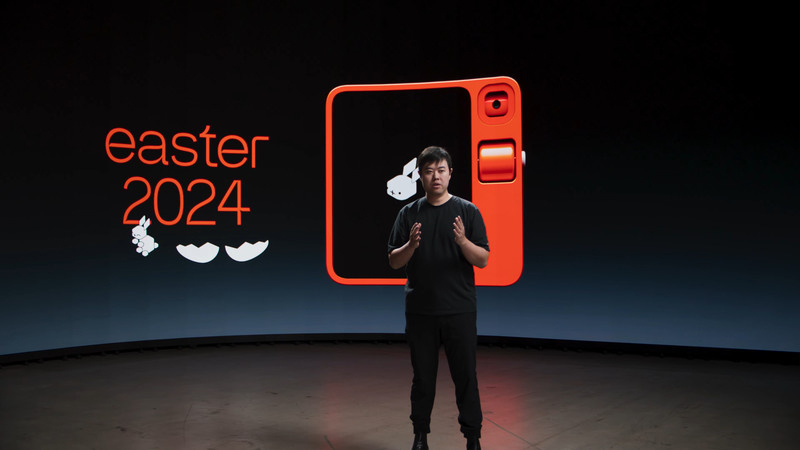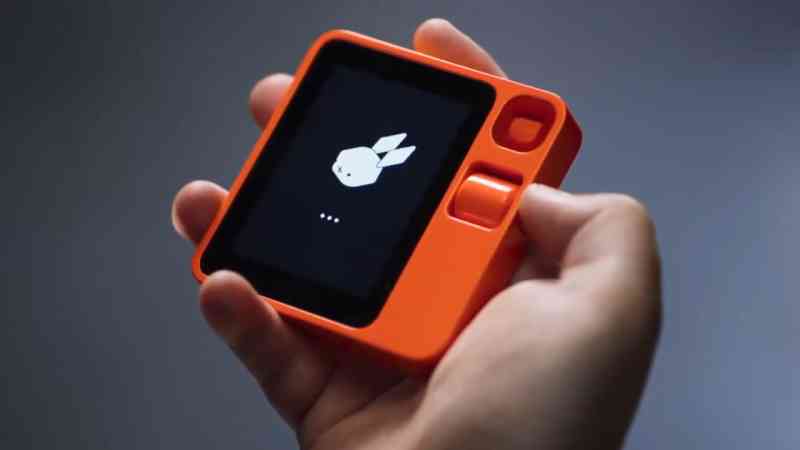A new pocket gadget that acts as your personal assistant is the latest device using artificial intelligence to try to make our lives easier.
The rabbit R1 is designed to interact with the increasing number of apps in our lives, so we don’t have to. Users control it using their voice and its developer is billing it as an Alexa-type device that not only responds quickly but also swings into action.
“We’ve come to a point where we have hundreds of apps on our smartphones with complicated UX [user experience] designs that don’t talk to each other,” Jesse Lyu, chief executive of rabbit, a California-based start-up, said. “As a result, end users are frustrated with their devices and are often getting lost.”
• Voice-controlled bidet and portable ‘microwave’ unveiled at CES
During a demonstration, Lyu asked the R1 to play music from Spotify — and asked it about song lyrics — order a taxi and buy a pizza. He also asked it to perform a more complex task that would require using multiple apps on a smartphone.
“I want to take my family to London, there will be two of us and a child, aged 12 … January 30 to February 5,” he told the device. “Can you plan the entire trip for me with cheap non-stop flights, grouped seats, a cool SUV and a nice hotel that has wi-fi.”
The R1 delivered some options, from which Lyu then chose, although it was not possible to see the screen when he did that.
The R1 is not designed as a replacement for the smartphone, however, which many see as its most serious drawback, given that the big phone companies are expected to incorporate AI into their devices. Next week Samsung will unveil a Galaxy phone with AI capabilities.
“We’re not trying to kill your phone,” Lyu said. “The phone is an entertainment device but, if you’re trying to get something done, it’s not the highest efficiency machine.”

Leo Gebbie, an analyst at CCS Insight, said: “The rabbit R1 will probably struggle to claim a space in users’ lives.
“The interface looks innovative and I believe it’s an early indicator of the direction of travel for smartphone operating systems over the coming years, where AI can automate far more of our apps and services without needing the same level of human input.
“But I’m not convinced people will want to carry around a second device to get these benefits, and may prefer to just wait for similar features to reach their existing smartphones over the coming years.”
Other standalone AI devices are in the offing. The AI Pin, which attaches to clothes, has already been launched by the start-up Humane and offers similar capabilities to the R1 — but is designed as a replacement for the smartphone.
• Meet the eerie AI clones that can replace you on the web
Sir Jony Ive, the former Apple designer, is also developing an AI device with OpenAI, the company behind ChatGPT.
The rabbit R1, which is designed by the Swedish company Teenage Engineering, can be operated via a button on the side, vocal commands and the touchscreen.
It also has a camera that can respond to your surroundings. Lyu pointed it at ingredients in a fridge and asked for a low-calorie recipe.
It is powered by a bespoke operating system called rabbit OS and an AI program described as a “large action model”. Priced at $199, it is available for pre-order in the US only, with delivery later this year.
Gebbie said the price meant there would be “plenty of technology enthusiasts willing to try it out” but added that the challenge for any new arrival “is finding a place on a user’s body or in their pockets”.
“The only true success stories have been smartwatches and fitness trackers,” he said. “Other promising concepts often fall down when the effort needed to wear and use them outweighs the value of using it.”
